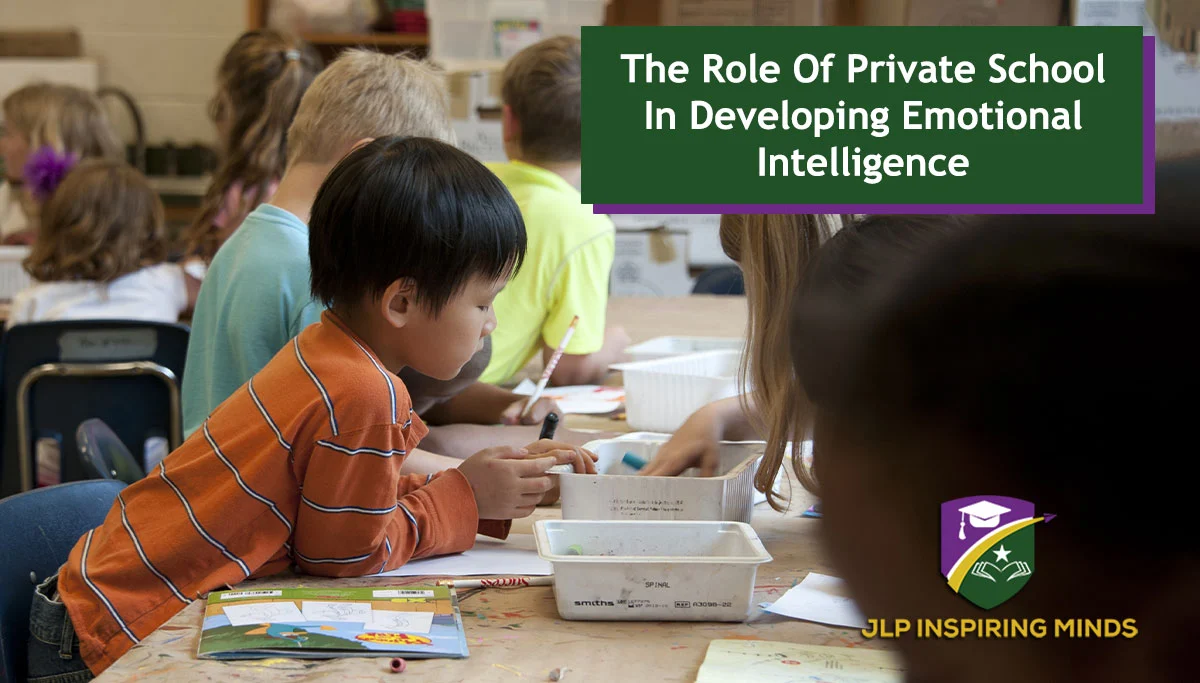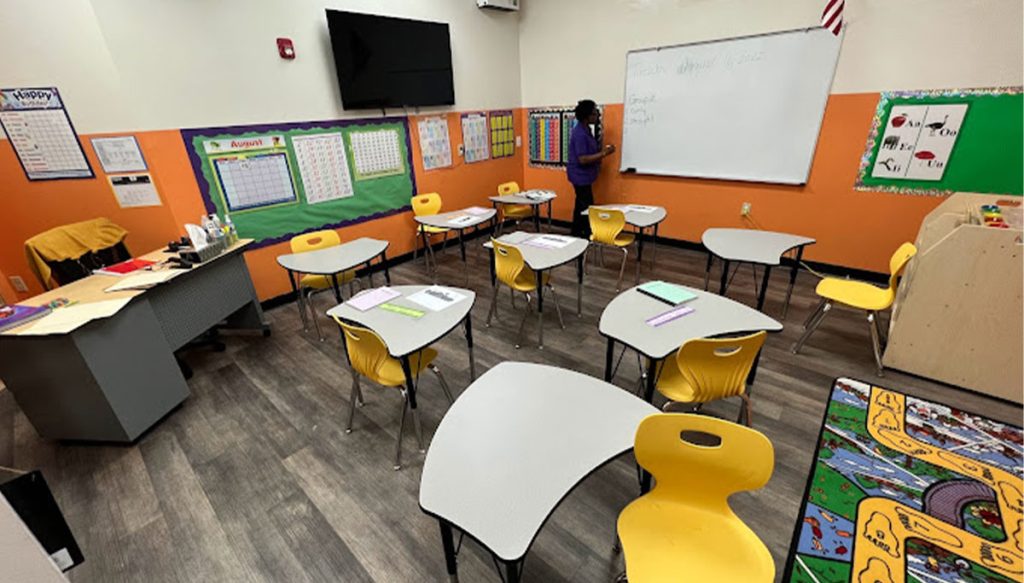
Emotional intelligence can be defined as being able to recognize, understand, and manage your own emotions while remaining attuned to the emotions of others. Developing emotional intelligence (EI) is crucial to human interaction and personal development. Teachers at private schools know that by prioritizing the development of emotional intelligence, they are laying a solid foundation for strong, compassionate leaders and emotionally resilient citizens.
Read on to learn more about how private schools help cultivate EI in young children.
The Five Elements Of Emotional Intelligence
Emotional intelligence (EI) is a vital aspect of human interaction and personal development. Psychologist Daniel Goleman classified emotional intelligence into five categories, namely:
- Self Awareness
- Self Regulation
- Motivation
- Empathy
- Social Skills
Let’s look at each category individually:
- Self-Awareness
Self-awareness is in tune with one’s feelings. It is the ability to know what one is feeling and why they have that feeling. It includes knowing what one is feeling at the time, and how that is affecting others.
Self-awareness also involves knowing one’s strengths, weaknesses, norms, and values, while using that knowledge to effectively navigate social situations.
- Self-Regulation
Self-regulation is also referred to as self-control. This element involves having the ability to manage emotions and impulses, and to think before acting. Self-regulation also requires adapting to various circumstances and remaining calm under pressure.
Self-regulation is a vital element that allows one to make rational decisions and maintain healthy relationships.
- Motivation
Motivation can be described as the individual’s drive to improve and achieve. Motivated individuals are driven by intrinsic factors like purpose and personal fulfillment.
Motivated individuals are assertive, and very resilient in pursuit of their goals. They set meaningful goals that they pursue even in the face of obstacles.
- Empathy
Empathetic people are attuned to emotional needs, can see another perspective, and share the feelings of others. They acknowledge and respond kindly to others, even if they do not necessarily agree with them.
Demonstrating genuine concern, empathetic people build strong interpersonal connections and can successfully navigate a variety of social dynamics.
- Social Skills
Known as “people people,” those with good social skills are considered trustworthy, team players, and very confident communicators. They are good listeners and often very effective leaders.
People with developed social skills are confident enough to inspire and motivate others to succeed. They communicate persuasively and can successfully navigate most social situations. They are often seen as successful in both personal and professional realms.
How Private School Teachers Assist In Developing Emotional Intelligence
Teachers play a vital role in helping children develop social and emotional intelligence. They do this largely by providing a child-centered education, employing several strategies to promote and develop emotional intelligence in the classroom.
Their methods can focus on a single element, or all the elements simultaneously. Here are some of their methods, broken down by elements:
Self-Awareness
Developing self-awareness is crucial to emotional intelligence. Teachers can assist children when engaging in activities that allow them to identify and express various emotions in a safe and controlled environment.
This is an ideal time to expand the child’s emotional vocabulary and provide them with appropriate words to express their feelings more precisely. These activities can include:
- Visual Aids: Showing pictures or short clips of various facial expressions and asking the class to identify the emotion.
- Storytelling: The storyteller can ask the class to describe the characters and how they must be feeling in the scenario.
- Games: Children and teachers can act out different emotions without speaking, and the classmates must try to guess the emotion.
- Emotional check-ins: A regular time that is set aside daily where pupils can indicate their current emotional state. The discussion generated from this activity will vary depending on the child’s age.
Self-Regulation
Self-regulation is a vital skill that all children must develop from an early age. Mastering this skill will ultimately lead to their emotional well-being and academic success. In the classroom, the teacher assists with this life-skill development by:
- Teaching children to identify and appropriately verbalize what they are feeling (self-awareness).
- Providing a calm environment or a quiet corner where pupils can retreat when they need to regulate their emotions.
- Communicating expectations for appropriate behavior and tasks. This will help pupils understand what is expected of them and reduce uncertainty that produces anxiety.
- Providing choices with appropriate limits. Allowing children to make decisions contributes to the development of self-regulation skills.
- Teaching children appropriate conflict management skills and rewarding positive behavior with praise and rewards.
Motivation
There are several strategies that a teacher can apply to develop essential motivational skills that all children need:
- Set clear goals and rewards. When students understand what they are working towards, it will motivate them to actively participate in the process.
- Make the tasks and goals relevant. When children see the relevance of the task, they will be more motivated to engage in it.
- Create an inclusive supportive learning environment. When pupils feel valued and supported, they are more motivated to engage and complete allocated tasks.
- Shaping perspective. Teachers can be instrumental in helping children view challenges as opportunities that, with effort and persistence, lead to growth.
- Keeping lessons fresh and interesting. Making the learning experience as exciting as possible helps encourage a love of learning that motivates children to want to learn more.
Empathy
To foster positive social interactions and build a supportive community, pupils need to develop empathy. There are several strategies that teachers can use to teach children about empathy. These strategies include:
- Modeling empathetic behavior. By demonstrating empathy and kindness through their actions, teachers are a powerful role model.
- Role play activities. Organizing activities where pupils can “step into the shoes” of others will help them understand different perspectives and emotions.
- Creating a caring classroom culture. Encouraging open discussions about feelings and experiences helps establish classroom norms that focus on kindness, respect, and empathy.
- Engaging pupils in community projects or activities that involve helping others. Concrete examples of empathy are an excellent learning tool that exposes children to situations/people from various, often less privileged, backgrounds. This promotes a broader understanding and empathy for differences.
- Encouraging random acts of kindness. Private school teachers can reward this behavior where appropriate.
Assisting children in developing social skills is crucial to their overall well-being, and vital to developing interpersonal relationships. Private school teachers can assist in developing this skill in the following ways:
- Devoting time to teaching social skills, by demonstrating concepts like active listening, turn-taking, and using polite language.
- Modeling good social skills in their interaction with the children and with their peers. Children learn from what they see others doing.
- Using social stories and narratives to demonstrate good social skills.
- Simulating situations where children can practice social skills in a controlled environment. This practice will help them develop confidence to use these skills in real-life situations.
- Introducing a “buddy system” where children are paired up to support each other in various situations. This fosters accountability, cooperation, and companionship.
- Rewarding positive social behavior using praise or a simple reward system. This encourages children to continue practicing good social skills.
Children Develop Emotional Intelligence At JLP Inspiring Minds Private School

The dedicated teachers at JLP Inspiring Minds prioritize the development of emotional intelligence. We aim to foster a sense of belonging by offering opportunities for social and emotional growth.
Our comprehensive yet individual approach to education goes beyond purely academic achievement. We also strive to prepare children for success in both their personal and professional lives.
For more information, or to tour our facility, contact us at either 954-933-2982 or 954-746-5437 today.
